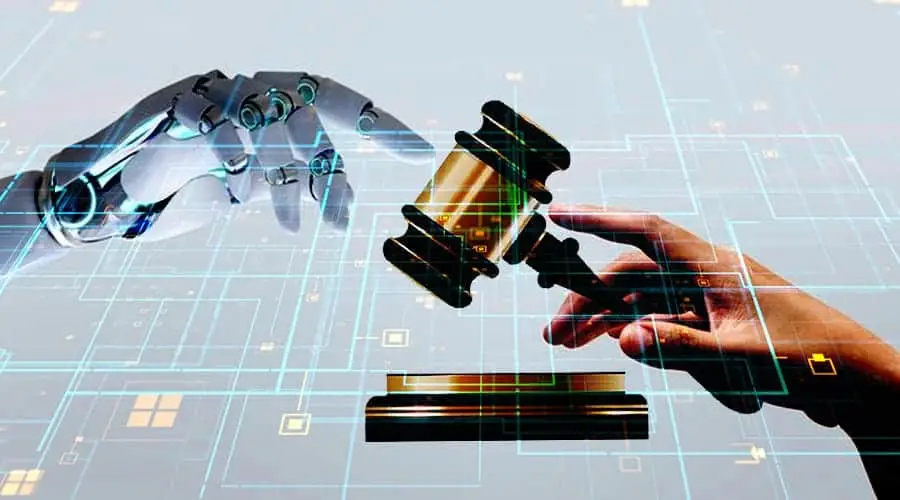By: Muhammad Rizwan Bhatti

The application of Artificial Intelligence has become irresistible to replace the reactive policing model with a predictive policing model. With the advent of technology, traditional policing is unable to cope with emerging crime patterns. However, no one can deny the significance of community policing, problem-oriented policing, Neighbourhood watch and corrective vigilance to reduce crime and build the confidence of the public in law enforcement agencies. No one can gainsay the fact that technology has already done a revolution in the betterment of policing and operational efficiency of Police.
Nevertheless, Police initiatives are galore to keep abreast with modern policing techniques. The initiatives taken by MD Punjab Safe City Authorities and DIG IT Ahsan Younas speak volumes about the visionary leadership of the Police. He has accomplished marvelous achievements through the establishment of Police Khidmat Marakaz, Tahafaz Marakaz (protection centers), Front desks, enhanced integrated IT-based CRMS, CMS, PSRMS, CRO, AVLS, HRMIS, DLMIS, and different Applications of Police to prevent, detect crime and apprehension of criminals. The launching of Virtual women’s police stations is another eminent hallmark of providing services to citizens. Additionally, in recent months, RPO Faisalabad Dr. Muhammad Abid Khan successfully traced rape cases with minors with the exquisite application of Forensics after getting evidence of all sorts adopting meticulous and professional expertise.
Artificial Intelligence in the broader sense is the simulation of human intelligence processed and exhibited by machines, especially computer systems. Artificial Intelligence (AI) has huge potential to buttress law enforcement agencies, including the police force in Pakistan. With its unparalleled capacity to analyze massive data, identify crime patterns, and help expedite decision-making processes, AI can significantly augment the effectiveness, efficiency, and accountability of the Pakistani police. To enhance police performance, it is essential to focus on training, surveillance, attitudinal change, building investigative skills, effective patrolling, identification of crime pockets, impeccable collection of evidence, protection of witnesses, securing public trust, collection of data of hardened criminals, a better surveillance mechanism, rewarding community policy and public engagement.
Predictive policing is the major hallmark of modern policing. The employability of AI can do this task in a befitting manner. The analysis of daily crime figures, patterns, modus operandi of criminals, time insights, and identification of crime pockets help in forecasting the likelihood of incidents by developing cogent Artificial algorithms. So, the predictability of the occurrence of crime and its pattern can be done through AI. The process of prediction enables police hierarchy to formulate crime prevention policies instead of resorting to a reactionary approach to fight against crime and criminals.
Surveillance helps in the identification and seizure of criminal and nefarious elements. The establishment of safe city authorities in four big cities including Faisalabad, Gujranwala, Rawalpindi, and Multan along with 18 smart safe city projects would be a landmark achievement and would help in buttressing the capacity of police to improve the surveillance mechanism to render big cities safe and secure. It is praiseworthy that PPIC3 Safe City Lahore is doing its utmost for the prevention and detection of crime in the capital city of Lahore. AI-embedded surveillance systems can bolster traditional CCTV cameras by enabling potential monitoring systems, identification of hotbeds of narcotic addicts, facial recognition, number plate recognition, smooth flow of traffic, mitigation of road accidents, and behavioral pattern analysis. These systems can be especially beneficial in congested traffic areas, border control management systems, and protection of vulnerable infrastructure. The security concerns in Pakistan are rampant and pervasive, therefore, AI-enhanced surveillance processes can help in the identification of scoundrels, tracing out of criminals, and thwarting terrorist activities.
The application of AI algorithms can help in reducing subjectivity and bias in policing by emphasizing on analysis of objective data rather than subjective human intuitions. It can help in reducing flagrant bias, and subjectivity in decision-making processes by employing Artificial intelligence tools and establishing the fair, speedy, critical, and above-board dispensation of justice. Moreover, the effective usage of AI will help in reducing the cases of high-handedness and manhandling by monitoring police conduct by employing body cameras, audio recordings, and automated oversight mechanisms, guaranteeing adherence to ethical bindings and procedural manuals.
In Pakistan, the criminal justice system faces redoubtable predicaments such as a backlog of cases and resource impediments, solutions through the usage of artificial intelligence can enhance expediting the process of investigations and facilitate the outcome of investigation cases. AI-powered algorithms can smooth the crime investigation processes by evaluating forensic evidence, identifying similarities between cases, and generating leads for investigators. Additionally, AI tools can assist in managing caseloads, prioritization of tasks, and maximization of resource utilization within law enforcement agencies.
Community policing and community engagement are the best strategies to get the public trust and reduction of crime in society. Chatbots, social media evaluation tools, and monitoring of online platforms help citizens to report crimes, seek assistance, and give feedback to the police. By engendering transparency, trust and confidence, AI-driven community policing initiatives can bolster and forge the bond between the police and the public, leading to safer neighborhoods and fructifying crime mitigation strategies.
Training is an important segment of the character and capacity building of police. AI-based simulations and virtual reality training programs can foster the skills, expertise, and capabilities of police officers in disparate scenarios, ranging from crisis management to de-escalation strategies. The employability of Artificial Intelligence helps in enhancing the comprehension and solution of problems. AI-based simulation training for weapon handling and learning driving skills is significant for police training.
Though, the benefits of AI are galore challenges are there that make it difficult to employ artificial intelligence without any let or hindrance. However, secrecy, data protection, and effective dissemination are awfully necessary to safeguard sensitive information, and ensuring data safety is paramount when deploying AI systems in law enforcement.
Moreover, to address Ethical considerations, such as algorithmic bias, transparency, and accountability is essential to additionally, legal frameworks must be established to govern the use of AI in policing, including guidelines for data collection, retention, and sharing. Moreover, the employability of computer technology has benefitted a lot in the smooth functioning of police work. There is a requirement for massive funds to develop technology infrastructure, capacity building, and IT-related training of police officers. So, Significant resource allocation and appropriation of sizeable funding is sine-qua-non for equitable access to the necessary tools and application of Artificial Intelligence for police reforms.
Furthermore, the public feels that surveillance and monitoring through technology-based tools is an infringement and encroachment on the freedom and right to privacy. Therefore, it is essential to build Public trust and display the importance of AI in the accomplishment of police work. Building public trust and acceptance of AI in policing requires transparent communication, community engagement, and accountability mechanisms. However, there is a pressing need to engage relevant stakeholders, academicians, IT professionals, think tanks, literate members of civil society, and notables from different walks of life to infuse confidence and dispel misgivings regarding the usage of surveillance mechanisms without bias and contravention of legal regime.
Undoubtedly, Artificial Intelligence has the robust capacity to overwhelmingly reform the police by augmenting operational efficiency, expediting decision-making processes, and ensuring accountability. However, in order to get the desired results, a holistic approach caters to ethical, legal, security, and societal considerations. The usage of Artificial Intelligence necessitates transparency, objectivity, and effective and fair law enforcement mechanisms that would serve the modern demands in the prevention and detection of crime. The real-time analysis of crime through AI would help in implementing the proactive approach to combat crime and prevent emerging threats. Moreover, to eschew bias and data fudging, there should be a robust oversight mechanism to ensure the usage of fair, accurate, and non-discriminatory Algorithms.
The writer is a Police Officer and Ph.D in Political Science from Govt College University Faisalabad. He can be reached at [email protected]








